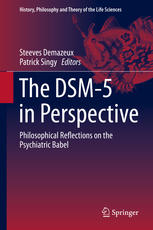

Most ebook files are in PDF format, so you can easily read them using various software such as Foxit Reader or directly on the Google Chrome browser.
Some ebook files are released by publishers in other formats such as .awz, .mobi, .epub, .fb2, etc. You may need to install specific software to read these formats on mobile/PC, such as Calibre.
Please read the tutorial at this link: https://ebookbell.com/faq
We offer FREE conversion to the popular formats you request; however, this may take some time. Therefore, right after payment, please email us, and we will try to provide the service as quickly as possible.
For some exceptional file formats or broken links (if any), please refrain from opening any disputes. Instead, email us first, and we will try to assist within a maximum of 6 hours.
EbookBell Team

4.3
78 reviewsSince its third edition in 1980, the Diagnostic and Statistical Manual of Mental Disorders (DSM) of the American Psychiatric Association has acquired a hegemonic role in the health care professions and has had a broad impact on the lay public. The publication in May 2013 of its fifth edition, the DSM-5, marked the latest milestone in the history of the DSM and of American psychiatry. In The DSM-5 in Perspective: Philosophical Reflections on the Psychiatric Babel, experts in the philosophy of psychiatry propose original essays that explore the main issues related to the DSM-5, such as the still weak validity and reliability of the classification, the scientific status of its revision process, the several cultural, gender and sexist biases that are apparent in the criteria, the comorbidity issue and the categorical vs. dimensional debate.
For several decades the DSM has been nicknamed “The Psychiatric Bible.” This volume would like to suggest another biblical metaphor: the Tower of Babel. Altogether, the essays in this volume describe the DSM as an imperfect and unachievable monument – a monument that was originally built to celebrate the new unity of clinical psychiatric discourse, but that ended up creating, as a result of its hubris, ever more profound practical divisions and theoretical difficulties.